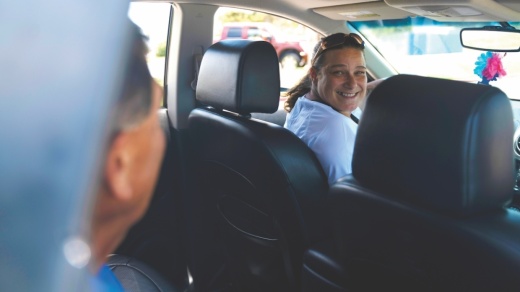Feonix Mobility Rising, a nonprofit focused on health and transportation equity, asked McKinney City Council during a Feb. 1 work session for support on a program that would provide necessities to residents.
The program, informally called the Wellness Wagon, would deploy two self-driving vehicles to deliver fresh food and non-narcotic medications to McKinney’s underserved population. The North Central Texas Council of Governments is collaborating with Feonix on the project.
The Wellness Wagon would serve those living in poverty, people with disabilities and senior citizens. McKinney has more than 13,000 people living at or below the federal poverty level, according to the presentation.
In addition to deliveries, the Wellness Wagon would be designed as a telehealth resource. Vehicles would have designated parking locations—for example, a patient’s residence or in the parking lot of a senior center—for patients to virtually visit with healthcare providers.
Valerie Lefler, executive director of Feonix Mobility Rising, told the council that the Wellness Wagon would serve as a “digital house call” for those without home internet access or those whose health conditions limit their mobility.
“There are all kinds of testimonials and stories of people that needed treatment or were going to a specialty care appointment that was denied by insurance, and we make it happen,” Jessy Tackett, Feonix Mobility Rising’s communications director, told Community Impact Newspaper, adding that most of the nonprofit’s vehicles are wheelchair accessible.
The Wellness Wagon is expected to receive $4.9 million in federal funding, according to the presentation. An additional $250,000 would come from local organizations suggested by the city.
The program’s vehicles would go through two phases of teleoperation testing with a safety driver before fully autonomous driving is launched, according to the presentation. Safety drivers would make notes on the vehicles’ routes to optimize drive time in addition to checking in on patients to ask about their delivery experience.
Feonix is asking the city to provide guidance on service areas, which would include semi-rural areas in addition to paved roads. The initial rollout would not include high-density areas for safety reasons, Lefler said.
The North Central Texas Council of Governments and Feonix are planning deployments for both McKinney and southern Dallas, which has more than 88,000 residents living at or below the federal poverty level, according to the presentation.
This would be Feonix’s first initiative involving autonomous vehicles, Tackett said. The nonprofit provides transportation solutions in nine states. The current operations partner with local healthcare providers and volunteers to transport or deliver items to seniors, veterans and others in need.
Tackett said that Feonix chose the Dallas metroplex to debut the Wellness Wagon because of the number of people in need. She added that many cities cannot afford an autonomous vehicle program, and the number of organizations willing to partner with the program influenced the decision to come to North Texas.
“There are a lot of people involved in this program,” Tackett said.
Potential local partners include Children’s Health, Parkland Hospital, Southern Methodist University and Dallas Area Rapid Transit, according to the presentation. The Autonomous Vehicle Alliance, Ford and the American Foundation for the Blind are also partners with Feonix.
Lefler said that there is almost “a year of paperwork” before vehicles could hit the road. The next step would be seeking a formal resolution of support from the city, which is scheduled for a vote at the council’s Feb. 15 meeting.
If the council grants support, Feonix and the North Central Texas Council of Governments would move forward with developing agreements with the Texas Department of Transportation. Afterward, Feonix plans to hire and train delivery drivers in the first quarter of 2023. By the second quarter, the organizations would host community stakeholder meetings with the city and law enforcement. The first autonomous vehicle is scheduled to be deployed late in the second quarter of 2023, per the presentation.
The second vehicle’s deployment would be scheduled for early 2024.
“It’s an exciting program, and I’m glad that McKinney is involved in something so innovative and progressive for our community,” Mayor George Fuller said at the meeting.





